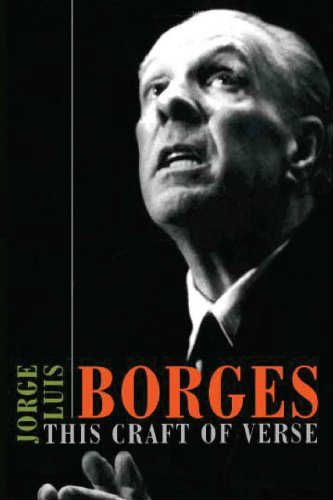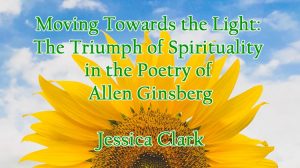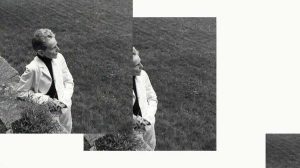I read Jorge Luis Borges’ This Craft of Verse in one sitting. It is a collection of six essays originally given as lectures at Harvard University in 1967-1968. The tone is easy and conversational. Borges speaks about the reader’s interaction with a poem, metaphor, the epic, translation and translatability, the relation between language and thought, and his own “poetic creed” as a reader and writer.
 For Borges, a poem happens when it is experienced by the reader or listener. He uses Keats’ poem “On First Looking into Chapman’s Homer” as an example of the reader/listener’s first experience with a poem “like some watcher of the skies / When a new planet swims into his ken”: “Here we have the poetic experience itself,” Borges explains. He recounts his first experience with Keats’ poem when he was young: “I do not think I understood the words, but I felt that something was happening to me. It was happening not only to my mere intelligence, but to my whole being.”
For Borges, a poem happens when it is experienced by the reader or listener. He uses Keats’ poem “On First Looking into Chapman’s Homer” as an example of the reader/listener’s first experience with a poem “like some watcher of the skies / When a new planet swims into his ken”: “Here we have the poetic experience itself,” Borges explains. He recounts his first experience with Keats’ poem when he was young: “I do not think I understood the words, but I felt that something was happening to me. It was happening not only to my mere intelligence, but to my whole being.”
For Borges, poetry is indefinable: “We know what poetry is. We know it so well that we cannot define it in other words, even as we cannot define the taste of coffee, the color red, the meaning of anger, love, hatred, the sunrise … These things are so deep in us that they can be expressed only by those common symbols that we share. So why would we need other words?”
The essay/lecture I found most intriguing was “The Telling of the Tale”, about epic poetry. Borges points out that in ancient times, in that of the Greeks, the Sumerians, the Norsemen, to name a few, a poet was not merely a writer of verse, but a “’maker’–not only as an utterer of those high lyric notes, but also as the teller of a tale. A tale wherein all the voices of mankind might be found—not only the lyric, the wistful melancholy, but also the voices of courage and of hope,” qualities which are very much needed in our early twenty-first century.
The telling of the tale, Borges argues, should be brought back into poetry, where it has its origins. Of course there is the novel, which is capable of becoming a vehicle for epic (War and Peace, for instance, and Borges cites Seven Pillars of Wisdom as almost an epic “hampered by the fact that the hero is the teller, and so sometimes has to belittle himself”), but the modern novel is mostly a vehicle for cynicism and irony or, at the very least, a stale “realism”. “People are hungering and thirsting for epic,” Borges concludes, “Think of the chief novels of our time—say Joyce’s Ulysses. We are told thousands of things about the two characters, yet we do not know them. We have better knowledge of characters in Dante and Shakespeare, who come to us—who live and die—in a few sentences.” There is a tendency in contemporary literature to pump a piece full of detail, but something gets buried: the story. Poetry may actually be better equipped to tell a tale: the practiced poet knows which details matter and which do not; the poet knows how to say more with less.
Borges, I think, is more of a reader than a writer. He himself says as much in the last essay/lecture, “A Poet’s Creed”: “I think the happiness of a reader is beyond that of a writer, for a reader need feel no trouble, no anxiety: he is merely out for happiness.” The title of this book, This Craft of Verse, may be a misnomer; Borges takes a more Romantic view of poetics, a sort of ambivalence to craft, the nuts and bolts of poetic creation, and emphasizes imagination and “the dream”: “What does being a writer mean to me? It means simply being true to my imagination … When I am writing something, I try not to understand it … I merely try to convey what the dream is.” And this, I think, is also something that is sorely needed in contemporary American poetry: emphasis on vision and imagination rather than on execution. But execution is easier to teach and quantify and assess: you can’t put a grade on vision.





Greg Ormson says
Borges explains. He recounts his first experience with Keats’ poem when he was young: “I do not think I understood the words, but I felt that something was happening to me. It was happening not only to my mere intelligence, but to my whole being.”
I understand this and it’s good reminder. It’s how I felt when I first heard a high-powered theological scholar from the Lutheran School of Theology in Chigago lecture in a public forum. I think the subjects were eschatology and Christology, but I’m not sure.
In any case, I knew something was being said that I wanted to know about … and that’s the beginning of my story.
gregory ormson says
Michael –
Your summary of Borges’ lectures makes me want to get the book. Thanks.